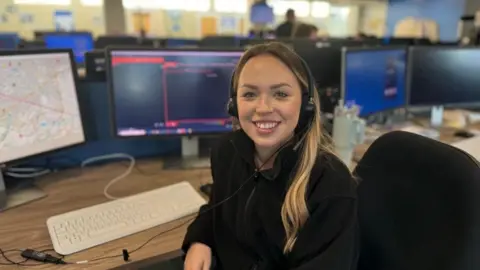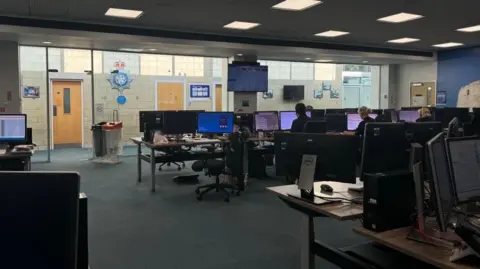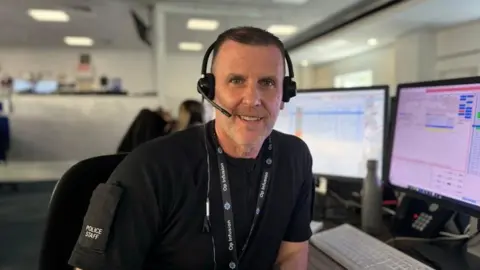'I have a harder shell now', says 999 call handler
 BBC/ Emily Johnson
BBC/ Emily JohnsonMore than 76,000 emergency 999 calls have been picked up by North Yorkshire Police so far this year, with each one answered within an average of just six seconds.
As the UK marks Emergency Services Day, the BBC went behind the scenes at the control room in York.
Rhiannon Gardener is one of the youngest call handlers working for North Yorkshire Police, at just 21.
Before her policing career she worked in a pub alongside her dad, which she said "could not have been more different".
She has worked in the control room for just over a year, where she deals with 999 and 101 calls, as well as answering email reports.
"I definitely think I have a harder shell now," she said.
"It was difficult at the start, I would get upset at things I wouldn't now, but it was what I was meant to do and I'm good at it."
 BBC/ Emily Johnson
BBC/ Emily JohnsonDuring her 12-hour shift, often panicked members of the public ring for her help with ongoing situations, from missing people to violent fights.
"My job is to find out where they are, who is involved and what is happening, all in two minutes," she said.
"While they're talking I'm typing, and that can be quite hard when they're upset and not engaging."
It is the call handler's job to stay calm, take control of the call and pay close attention when the caller may not be able to speak freely.
"A woman rang once who was involved in a domestic incident, and I heard her say to a man she was on the phone to her friend," Rhiannon said.
"I had to write notes on the argument I could hear and make sure to only ask yes or no questions to get her help."
'Leave worries at work'
A "frustrating" part of the job, she said, was that she did not always find out the outcome of the emergencies but said it was a relief when she heard a suspect had been arrested.
She said she had had to become used to facing abuse over the phone, often being called names or shouted at.
"I don't stand for it, I just remind them they called for my help.
"I'm very close to my colleagues, my manager is lovely and there is a counselling service, so if the calls are getting to me, I have a support system.
"You do think about the job when you get home, but you have to try to leave worries at the door so you don't pass them on to your family."
Despite the pressure, Rhiannon said the police was where she belonged and encouraged others thinking of joining to "persevere".
"It definitely gets easier," she added.
 BBC/ Emily Johnson
BBC/ Emily JohnsonAfter call handlers have gathered their notes they are passed on to dispatchers, like Jon Bridge.
His job is to prioritise the incidents and deploy officers to the locations, while also scheduling call-outs for non-emergencies.
"No one is free at the moment," he said, pointing to a list of officers in the York area.
"It's hard to juggle because resourcing is a big issue in the police and it's always busy."
Jon, 52, has worked in police control rooms for 23 years, previously being based in West Yorkshire.
"We deal with a variety of people and sometimes the expectations of the public are hard to meet," he said.
"I have to ring and apologise when delays happen, some people accept it and others are disgusted.
"A lot seem to think there's an officer at the end of every street waiting to help, but it's not like that anymore."
'Pray for rain'
Jon said one of the most frequent types of call they would receive would be concerns for safety.
"A lot of our resources get tied up with mental health patients," he explained.
"Mental health services aren't very accessible, so we will be called to deal with it but after patients are sectioned, they are often released for the same incident to happen again."
The busiest times for the dispatchers are Saturday nights, holidays and paydays, according to Jon, when people have been out drinking.
"We pray for rain here when it gets to a Bank Holiday weekend," he said.
Aside from the challenges, Jon said he loved his job and it could be very rewarding.
National 999 Day recognises the work of all emergency service colleagues, such as Jon and Rhiannon.
North Yorkshire Police Ch Supt Fiona Willey said: “I personally would like to thank all the officers and staff for everything that they do for the force and the wider communities of North Yorkshire.
"The professionalism and dedication that they deliver daily is nothing short of outstanding."
Listen to highlights from North Yorkshire on BBC Sounds, catch up with the latest episode of Look North or tell us a story you think we should be covering here.
